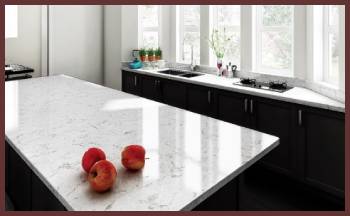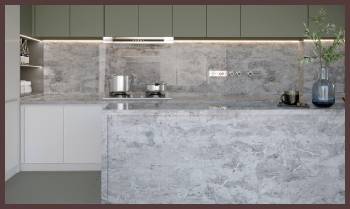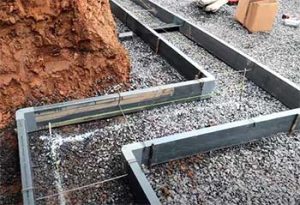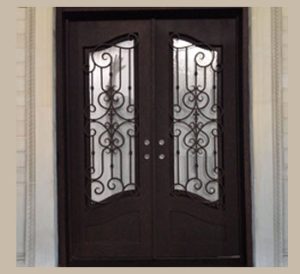There’s a revolution in the world of interior design and home remodeling, and its name is Pompeii Quartz. Renowned for its beauty and durability, this engineered stone has quickly become a fan favorite.
This article will delve deep into the pros and cons of Pompeii Quartz, addressing common questions about its origin, quality, and how it compares with other quartz brands.
What is Pompeii Quartz?
Pompeii Quartz is an engineered stone made from a composite of natural quartz and polyester resin. This combination results in a highly durable, beautiful, and non-porous surface that’s perfect for kitchen countertops, bathroom vanities, and more.
Pros of Using Pompeii Quartz

- Unparalleled Durability
Pompeii Quartz is celebrated for its robustness. This engineered stone is both scratch and stain-resistant, meaning it can withstand the wear and tear of everyday life. Not only does this make it an ideal choice for kitchens, but it also guarantees a long-lasting shine that won’t fade over time.
- Aesthetics Galore
When it comes to looks, Pompeii Quartz doesn’t disappoint. It comes in a broad spectrum of colors and patterns, ranging from pure whites, rich blacks, to intricate marbled designs. This gives homeowners the freedom to tailor their spaces to their unique tastes.
- Maintenance-Free
Unlike natural stones that require regular sealing, Pompeii Quartz is nearly maintenance-free. Its non-porous nature means it doesn’t harbor bacteria, making it a hygienic choice for kitchens and bathrooms.
Read More: About Valiant Quartz
Cons of Using Pompeii Quartz

- Limited Heat Resistance
Although Pompeii Quartz is highly durable, it’s not entirely heat resistant. Prolonged exposure to high temperatures can lead to discoloration or even cracks. So, if you’re a passionate home chef who often deals with hot pots and pans, you may need to exercise caution.
- Cost
The quality and beauty of Pompeii Quartz come at a price. It’s generally more expensive than other countertop materials like laminate or tile. However, its durability and low maintenance often justify the cost in the long run.
- Limited Outdoor Use
Pompeii Quartz is not recommended for outdoor use. UV rays can cause the color to fade over time. If you’re considering an outdoor kitchen or entertainment area, this might be a limiting factor.
Frequently Asked Questions (FAQs)
Absolutely. Pompeii Quartz’s durability, variety of design options, and low maintenance requirements make it a top contender in the realm of engineered stones. Its pros significantly outweigh its cons, making it a great investment for any homeowner.
No, Pompeii Quartz is not made in China. It’s a product of the United States, manufactured by UMI Stone, a reputable company known for producing high-quality surfaces.
Pompeii Quartz is not quartzite. Quartzite is a naturally occurring stone, while Pompeii Quartz is engineered stone made from a composite of natural quartz and polyester resin.
Quality varies among quartz brands, but Pompeii Quartz is undoubtedly one of the top-tier options. It is renowned for its durability, aesthetics, and low maintenance needs.
In terms of mimicking natural stone aesthetics, Pompeii Quartz stands tall. Their engineered stone offers designs that closely resemble natural stones like granite, marble, and quartzite.
The quality of quartz can vary significantly from one manufacturer to another, regardless of geographical location. While some Chinese manufacturers produce high-quality quartz, others may not meet the same standards.
Read More: About Pros And Cons Of Alleanza Quartz
Comparing Pompeii Quartz with Other Brands
When it comes to engineered stone, the market is teeming with options. Several brands offer quartz countertops, each with its unique selling points and drawbacks. Let’s see how Pompeii Quartz measures up against some of its most prominent competitors.
Pompeii Quartz vs. Caesarstone
Caesarstone is another popular brand in the quartz countertop market. While both brands offer a variety of colors and patterns, Pompeii Quartz boasts a wider selection. However, Caesarstone is often praised for its innovative designs that push the boundaries of quartz aesthetics. It’s important to note that both brands deliver high-quality products with comparable durability.
Pompeii Quartz vs. Silestone
Silestone, manufactured by Cosentino, is known for its patented bacteriostatic technology, which gives its quartz surfaces antibacterial properties. This could be a significant advantage in kitchens and bathrooms. However, Pompeii Quartz tends to outshine Silestone in terms of design variety and the natural look of its products.
Pompeii Quartz vs. Cambria
Cambria is a U.S.-based manufacturer that produces premium quartz surfaces. Compared to Pompeii Quartz, Cambria might have a slight edge in terms of warranty, as they offer a limited lifetime warranty on their products. However, Pompeii Quartz often wins in terms of affordability while still delivering top-tier aesthetics and durability.
The Verdict on Pompeii Quartz
In conclusion, Pompeii Quartz is a leading player in the world of engineered stone countertops. Its superior durability, extensive design range, and easy maintenance make it an excellent choice for homeowners seeking to elevate their spaces.
While it does come with a few drawbacks, such as limited heat resistance and outdoor applicability, these are common to most quartz surfaces and can be managed with proper care. And although it’s a premium product with a corresponding price tag, the long-term benefits of investing in Pompeii Quartz are undeniable.
So, whether you’re renovating your kitchen, updating your bathroom, or simply wanting to add a touch of luxury to your home, Pompeii Quartz offers a combination of functionality and beauty that’s hard to beat.
Further Considerations
As with any major home improvement decision, it’s essential to consider your unique needs and circumstances when choosing a countertop material. While this review provides an analytical perspective on Pompeii Quartz, personal preferences regarding style, maintenance, and budget will ultimately guide your decision.
If you’re considering Pompeii Quartz, visit a local showroom or request samples to see the product firsthand. This will help you make a well-informed decision about whether this engineered stone is the perfect fit for your home.



